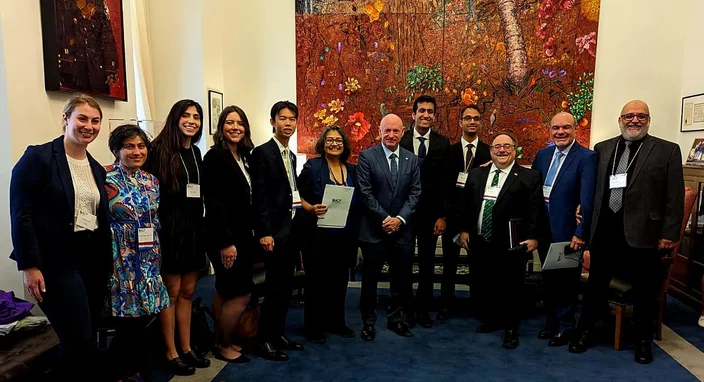Member Perspective: Empowering Physicians through Advocacy
By Nikhil Sood, MD, Wesley Peng, Taylor Viggiano, MD and Alexis Bailey, MD.

Members of the Arizona ACP Chapter delegation with U.S. Senator Mark Kelly (D-AZ)
Physicians are typically focused on caring for patients, leaving little time for advocacy because the perception is that the effort will not change the outcome. I, too, shared this sentiment until I attended Leadership Day. While advocacy has always intrigued me, it felt disconnected from my daily job. Earlier this year, I was fortunate to learn about the American College of Physicians (ACP) Leadership Day. In this event, internal medicine physicians gather to speak directly with congressional members, advocating for issues affecting their daily practice and patients. Over the years, with grassroots-level advocacy efforts, this has become a pivotal platform for ACP’s 161,000 members to engage and bring pressing issues to the forefront. Arizona ACP is a 2500-member strong organization of internal medicine physicians, subspecialists, residents, and medical students.
Our journey to Capitol Hill for Leadership Day this year was remarkable. We joined ten delegates to represent the Arizona Chapter, led by AZ-ACP. For many of us, it was our first time speaking or lobbying with legislators and advocating nationally. Our mission was clear: to engage with lawmakers in Washington, DC, and garner support for crucial healthcare issues affecting doctors and patients. This was not just a trip but a powerful opportunity to advocate for health care policy and our patients, representing our state alongside passionate medical students, residents, and state ACP leaders.
This year’s event marked a historic milestone, with record attendance from all 50 states. On the first day, we commenced with a comprehensive briefing on the issues and a guide on advocating for our top priorities, reaffirming our influence in the healthcare landscape. The following day was dedicated to engaging with policymakers and advocating for internal medicine and public health issues.
We delved into three key issues that are crucial for the future of healthcare:
The Safe Step Act: We discussed a young artist struggling with safe step therapy, often termed “fail first.” She was taken off her regular rheumatoid arthritis medications when she switched insurance. She had to go through less effective and cheaper medicines for months, which she had failed previously. Unfortunately, this caused damage to her finger joints, and she could no longer pursue her dream. She stopped working as an artist. A few staffers of our Congressional members were moved by the story and promised to look more into this.
Support the Resident Physician Shortage Reduction Act of 2023: One of the students shared a story of his close friends who “matched” out of state because there were not enough residency positions in Arizona. As a hospitalist, when I try to discharge a patient, it is hard to schedule PCP visits, which sometimes take months. Due to this, I often see patients readmitted to the hospital, causing additional financial burden on the health system. Losing residents who would become future PCPs to other states because there are too few residency spots is a huge loss to our state, and we will only continue to feel that as the population ages. Hearing it from the student was a pivotal moment for the policymakers. This is where ACP grassroots-level advocacy is reflected at its best.
Over the last twenty years, physician payments have decreased by thirty percent when adjusted for inflation. Our advocacy for the Physician Fee Schedule Update and Improvements Act was particularly crucial. Dr. Eladio Pereira, one of our seasoned advocates from rural Arizona, noticed many physician practices shutting down due to declining reimbursement rates. We discussed how students and residents should consider going into primary care. These advocacy efforts could improve reimbursement rates for internal medicine physicians, supporting their practices and strengthening primary care.
Our journey to Capitol Hill from Arizona was surreal, from our first steps into the Hart Senate Office to our final steps. We felt heard as we caught Representative Schweikert in the Ways and Means Committee conference room and held deep conversations with Senator Sinema's lead healthcare policy expert. We witnessed progress working through differences to achieve bipartisan support for improving healthcare. Another highlight was shaking hands with Senator Kelly and discussing physician shortages with lead staffers underscored our national influence on healthcare policy.
We recognized that while Leadership Day is pivotal, it represents just one day in our ongoing efforts for ACP’s priorities to stay top of mind for policymakers. Leadership Day is a gathering and a platform that empowers physicians from all 50 states to shape policies that enhance healthcare access and delivery. It underscores the pivotal role of all healthcare professionals, including students and residents, in advocating for policies that impact patient care. The students and residents in our delegation were particularly inspired by this day, vowing to continue their health policy advocacy and advocate for their patients. Their enthusiasm and commitment were a testament to the power of grassroots-level advocacy. Having esteemed veterans like Drs. Shak Rehman, Shireen Jindani, Allan Markus, and Priya Radhakrishnan in our delegate group was incredibly humbling. The time we spent together was inspiring and reinforced the importance of remaining actively engage.
Biography:
Nikhil Sood is an Internal Medicine-trained physician who has been a hospitalist in Arizona, USA, for the last eight years. He works in an acute care cancer hospital affiliated with MD Anderson Cancer Center.
Wesley Peng: is a Warren Alpert Medical School medical student. For the past five years, he has been a researcher at HonorHealth in Arizona, USA, focusing on the social determinants of health in underrepresented Arizonan populations.
Taylor Viggiano: is an internal medicine resident at Mayo Clinic in Scottsdale, Arizona.
Alexis Bailey: is an internal medicine resident in Phoenix, Arizona.
Social media:
LinkedIn: https://www.linkedin.com/in/nikhil-sood2026 | X: @sood2026


